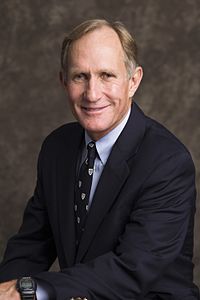
Back بيتر أغري Arabic بيتر اجرى ARZ Piter Aqre Azerbaijani پیتر آقره AZB Пітэр Эгр Byelorussian Питър Агре Bulgarian পিটার আগ্রি Bengali/Bangla Peter Agre Catalan Peter Agre Czech Peter Agre Danish
Peter Agre | |
|---|---|
 Agre in 2003 | |
| Born | January 30, 1949 Northfield, Minnesota, U.S. |
| Alma mater | Augsburg College (BA) Johns Hopkins University (MD) |
| Known for | Aquaporins |
| Awards | Nobel Prize in Chemistry (2003) Bloomberg Distinguished Professorships (2014) |
| Scientific career | |
| Fields | Medicine Chemistry Biochemistry |
| Institutions | Johns Hopkins Malaria Research Institute Duke University Case Western Reserve |
Peter Agre (/ˈɑːɡriː/; born January 30, 1949) is an American physician, Nobel Laureate, and molecular biologist, Bloomberg Distinguished Professor at the Johns Hopkins Bloomberg School of Public Health and Johns Hopkins School of Medicine, and director of the Johns Hopkins Malaria Research Institute. In 2003, Agre and Roderick MacKinnon shared the 2003 Nobel Prize in Chemistry for "discoveries concerning channels in cell membranes."[1] Agre was recognized for his discovery of aquaporin water channels.[2] Aquaporins are water-channel proteins that move water molecules through the cell membrane. In 2009, Agre was elected president of the American Association for the Advancement of Science (AAAS) and became active in science diplomacy.[3]
- ^ "The Nobel Prize in Chemistry 2003". www.nobelprize.org. Retrieved March 21, 2018.
- ^ Peter Agre on Nobelprize.org including the Nobel Lecture Aquaporin Water Channels
- ^ Earl Lane (2010). "Agre, Pickering: Science Diplomacy a "Critical Tool" in U.S. Foreign Policy". American Association for the Advancement of Science. Retrieved August 20, 2016.